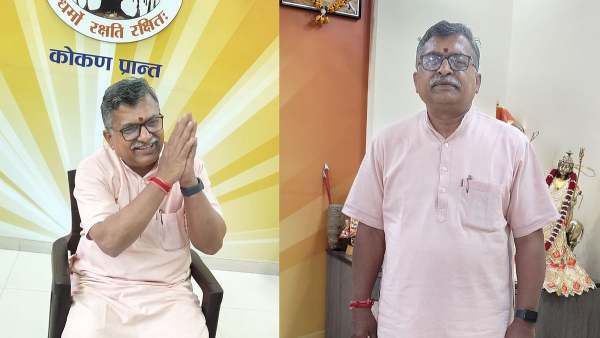
The Vishwa Hindu Parishad (VHP) has started a campaign to free Hindu temples from government control. Last month, Hindu leaders met in Vijayawada, Andhra Pradesh, to lay the framework for the programme. The draft of a new law to manage Hindu temples by independent trusts is ready. In an interview with the Free Press Journal, Milind Parande, General Secretary (Organisation), VHP, explained why they want the government to be a facilitator in managing Hindu shrines and not administrators. Parande was in Mumbai to talk to the media about the campaign.
Excerpts from an interview.
Q: The VHP and other Hindu organisations have talked about freeing temples from government control. However, there is little vocal support from the BJP. Why?
A: Since the Britisher's time, these temples have been under government control. Unfortunately even after we gained political freedom successive governments have continued with this practice. The time has come for people to be aware of the insult's gravity. Also, Hindu society is perfectly capable of taking care of its temples. This is discrimination against Hindus because the government does not control any churches or masjids. The first step is creating awareness amongst the society. That is why we organised a big meeting on January 5 in Vijayawada in Andhra Pradesh that over three lakh people attended.
Q: What was the result of the Vijayawada meeting?
A: Before that (the meeting) we met with the chief minister of Andhra Pradesh. We have constituted a think tank that includes people from Acharya Sabha, Adivakta Parishad, Vishwa Hindu Parishad, retired chief justices of high courts, and lawyers. We have formulated a proposed law and given that copy to Chandra Babu Naidu (Andhra Pradesh Chief Minister).
Q: Why was Vijayawada chosen as the venue for the meeting? Was it because of the scandal at Tirupati temple about animal tallow in the temple prasad?
A: The Chief Minister (Naidu), Deputy Chief Minister, Pavan Kalyan, and even the BJP, all of them were making favourable comments and statements. And because of the Tirupati Laddu controversy, they had taken some very positive steps in all these things. So we felt that yes, we should start from here.
Q: The government control of Hindu temples started with colonial-era legislation. Why did not governments get rid of the laws after independence?
A: I think the governments in power after Bharat gained freedom were not Hindu-centric. I do not think they thought about it and just looked at the money that the temples could give them and the power control those temples could give them. And those simple things dictated their actions. If one is Hindu centric then one will think about what will be the best for the Hindus.
Q: It is not just one law that gives the government control over temples. Practically every state has its laws. And then there are special laws for big shrines. How will you tackle the legal maze?
A: Oh, definitely. See, we have drafted a common law that has some basic tenets. One of the things is that the temples should be socially committed, in that sense they should do social service activities. Secondly, the temples will come under some umbrella organisation in the state. So we are calling it the state Dharmic Parishad type of thing. But we don't want to replace the government system with a private one. In our thinking, the temple management will be autonomous. And whatever agencies we are proposing, at the state and district level will only be facilitating agencies; they will not be controlling agencies. The management must include various sections of society. So we are proposing that scheduled castes, scheduled tribes, other sections of the society, and women as well. Then they will follow the Sampraday (community) rules, whatever Sampraday the temple belongs to. There will be a dispute resolution system.
Q: One of the arguments against loosening government control over temples is that private trusts could be corrupt, a claim not made for shrines managed by other religious communities. What is your reaction to this allegation?
A: It is a sweeping statement to say that Hindu temple trusts will be corrupt. Many private temples are doing social work. Are temples in government control not corrupt? Hindu society is perfectly capable of taking care of its temples.
Q: Where will the campaign go from here?
A: We will meet chief ministers in various states and give them the format of the draft law. We will have discussions with party leaders and meet members of state assemblies. Two or three meetings like the one in Vijayawada will be organised this year throughout the country.
The campaign can face hostility in states ruled by opposition parties, like Tamil Nadu and West Bengal.
Let them refuse. If they refuse it will help in creating awareness. It is a campaign, not an agitation. We met at the Kumbh Mela and discussed it there. We have our timetable for the next 10 months.